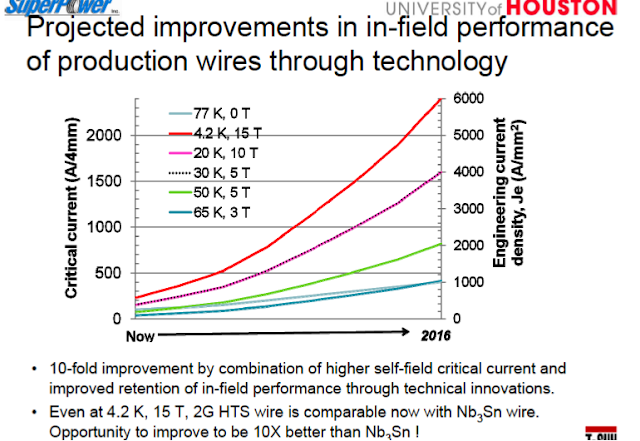MIT Technology Review – Superconducting Magnets for Grid-Scale Storage Swiss-based engineering firm ABB outlined plans for a 3.3 kilowatt-hour proof-of-concept SMES prototype. ABB is collaborating with superconducting wire manufacturer SuperPower, Brookhaven National Laboratory, and the University of Houston as part of the $4.2 million ARPA-E grant. The group’s ultimate goal is to develop a 1-to-2-megawatt-hour commercial-scale device that is cost-competitive with lead-acid batteries.
Latest presentation from Superpower inc on superconducting wire.
For Superconducting Magnet Energy Storage (SMES) to compete with lead-acid batteries and other technologies, SMES systems may need to be significantly larger than the 1-to-2-megawatt-hour devices envisioned by ABB. They may need to offer tens of megawatt hours of storage, Luongo says, “and the cheaper the other technologies get, the farther out that crossover point gets.”
Matching the price of lead-acid batteries would make SMES systems less expensive than flywheels but more expensive than pumped hydro or compressed air, according to a recent study by the Electric Power Research Institute. Pumped hydro, which stores energy by pumping water uphill, and compressed air, which stores energy in the form of air compressed in underground caverns, are the two leading methods for storing energy on a large scale today.
SMES systems have about the same life expectancy as pumped hydro and compressed air systems: 10-20 years, as opposed to 1-10 years for batteries and 8-12 years for flywheels, Minnihan says. He has reservations about ABB’s approach because it requires large quantities of high-temperature superconducting wires that at today’s prices would make grid-scale SMES systems prohibitively expensive.
Although the cost of superconducting wire has dropped significantly in recent years, Ramanan admits that it would need to fall by another 300 percent for SMES to be competitive with other grid-scale energy-storage technologies
If you liked this article, please give it a quick review on ycombinator or StumbleUpon. Thanks

Brian Wang is a Futurist Thought Leader and a popular Science blogger with 1 million readers per month. His blog Nextbigfuture.com is ranked #1 Science News Blog. It covers many disruptive technology and trends including Space, Robotics, Artificial Intelligence, Medicine, Anti-aging Biotechnology, and Nanotechnology.
Known for identifying cutting edge technologies, he is currently a Co-Founder of a startup and fundraiser for high potential early-stage companies. He is the Head of Research for Allocations for deep technology investments and an Angel Investor at Space Angels.
A frequent speaker at corporations, he has been a TEDx speaker, a Singularity University speaker and guest at numerous interviews for radio and podcasts. He is open to public speaking and advising engagements.






